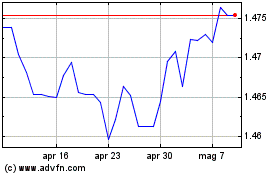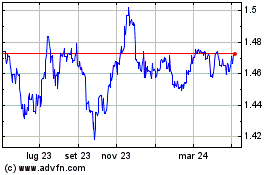ECB To Maintain Status Quo Amid Growth Risks
23 Gennaio 2019 - 7:23AM
RTTF2
The European Central Bank is set to leave its interest rates and
forward guidance unchanged on Thursday, after ending its massive
asset purchase programme in December, as a myriad of risks
including the persistent slowing of the economy, global trade
tensions and the Brexit chaos mar the outlook for Eurozone
growth.
The Governing Council, led by ECB President Mario Draghi, is set
to announce its latest policy decision at 7.45 am ET in Frankfurt.
The main refi rate is currently at a record-low zero percent and
the deposit rate at -0.40 percent. The marginal lending facility
rate is at 0.25 percent.
Eurozone interest rates were raised last in July 2011 by 25
basis points. The current forward guidance of the ECB suggests that
an interest rate hike is likely only in late 2019.
Given the weaker growth and inflation outlook, and the
persistent uncertainties linked to global trade and politics, some
economists now expect the bank to raise interest rates only in
2020.
That would make Draghi, the only ECB President thus far who did
not raise interest rates during his tenure. ECB Chief Economist
Peter Praet's term is set to end in May and Draghi's tenure in
October.
Draghi is set to hold his customary post-decision press
conference at 8.30 am ET in Frankfurt.
The bank ended its four-year long massive EUR 2.6 trillion Asset
Purchase Programme in December.
Saying that it is "enhancing its forward guidance on
reinvestment", the central bank stated that it will reinvest bond
sale proceeds "for an extended period of time past the date when it
starts raising the key ECB interest rates."
Policymakers chose to adopt a cautious stance towards terming
the risks to the euro area economic outlook as "downside", minutes
from December policy session showed. Instead, the ECB said the
risks remained "broadly balanced".
"The recent news has been so disappointing that policymakers are
likely to go further this time in acknowledging that the risks to
their economic forecasts (which will not be revised again until
March) are now tilted to the downside," Capital Economics economist
Andrew Kenningham said.
"Indeed, rather than providing a steer about the timetable for
further policy tightening, the Governing Council may soon have to
dust off its past language hinting at further policy loosening,"
the economist added.
In December, the ECB rate-setters assessed the risk situation as
"fragile and fluid", saying that risks could quickly regain
prominence or new uncertainties could emerge, the minutes said.
However, some members cited the emergence of new upside risks
and said the recent negative news have been factored into the
downward revision of the staff projection.
The ECB Staff trimmed the growth and inflation projections for
this year in December. The euro area growth forecast for this year
was trimmed to 1.7 percent from 1.8 percent. The inflation forecast
for this year was lowered to 1.6 percent from 1.7 percent.
Headline inflation eased to an eight-month low of 1.6 percent in
December, while core price growth held steady at 1 percent. "For
the time being,...being a cool dude who is on high alert rather
than panicking into impulsive action seems to be the right
strategy," ING economist Carsten Brzeski said.
The economist stressed that the situation is not yet threatening
enough for the ECB to return to crisis mode, nor was there a
quick-win instrument left in the bank's policy toolbox.
"Consequently, we expect ECB President Mario Draghi to leave the
ECB's forward-guidance on rates unchanged, while at the same time,
adding a dovish note by stressing the ECB's data-dependency and
downside risks to growth," said Brzeski, who thinks the bank will
wait at least until the June meeting before changing its forward
guidance on rates.
In the December meeting, the Governing Council also debated,
re-launching its offering of cheap loans with longer duration to
businesses. Under the ECB's earlier tool named the targeted
longer-term refinancing operations, or TLTRO, the ECB gives
longer-term loans to financial institutions at attractive rates to
boost lending in the real economy.
Draghi is likely to face several questions on the likelihood of
re-launching TLTRO during his post-decision press conference.
Reporters are also expected to pose questions on topics ranging
from trade protectionism, China slowdown to those on the domestic
front such as the the Italian budget crisis and the "yellow vests"
protests in France. Recent economic data such as confidence
indicators and the purchasing managers' survey measures have also
been relatively weak and suggested a broad-based slowdown across
the big four euro economies.
That said, the German economy ministry said the biggest euro
area economy likely avoided slipping into a technical recession in
the fourth quarter.
On Monday, the International Monetary Fund trimmed its growth
projections for this year and next to3.5 percent iand 3.6 percent,
respectively, saying that risks to the global growth are tilted to
the downside. The lender said euro area growth is set to slow from
1.8 percent last year to 1.6 percent this year, which is 0.3
percentage points less than the previous projection. Growth was
forecast to ease further in 2020 to 1.7 percent.
Grafico Cross Euro vs CAD (FX:EURCAD)
Da Mar 2024 a Apr 2024

Grafico Cross Euro vs CAD (FX:EURCAD)
Da Apr 2023 a Apr 2024
